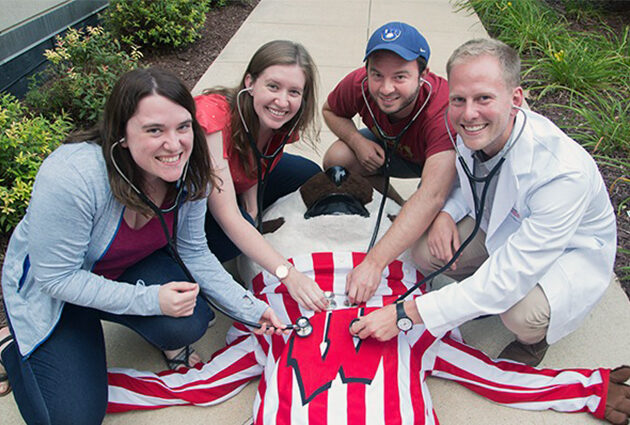
Medical Student Resources
The UW School of Medicine and Public Health is dedicated to providing you resources to support your academic and career success and personal well-being.
Academic Success
Student Academic Success Services (SASS) is composed of dedicated learning specialists who work with you to help you achieve academic success. Among many student success offerings, SASS organizes the popular Med*STAR program, which is available to entering students before the start of M1 year for a few well-rounded days of orienting to the rigors and pace of the MD curriculum.
SASS learning specialists, available via one-on-one scheduled appointments and drop-in meetings, can support you and provide resources in the areas of:
- Reading, test taking, time management, concentration and memory skills
- Disability accommodations
- Exam preparation and test anxiety
- Learning styles, note taking and study methods based on learning styles
- Tutor services
- Exam review
- US Medical Licensing Exam (USMLE) (Step 1, Step 2 CK) scheduling, preparation and practice
Academic and Career Advising
The Academic and Career Advising Program (ACAP) consists of three phases that focus on understanding yourself, exploring your options, choosing a specialty and obtaining a residency. The Academic and Career Advising Program is organized by the five houses that comprise the Neighborhood. Our houses exist for your career development and to build community and cultivate well-being while also helping you along your professional identity pathway through medical school. Each house hosts wellness sessions focused on taking care of your whole self — physically, mentally and emotionally — while in medical school.
Beginning in the first week of the first semester, UW medical students begin an invaluable process of self-reflection and exploration toward charting their career as a physician. Through a combination of one-on-one mentor and advisor meetings, assessment tools, and timely informational sessions, our students have constant support and school contact at every step of this process of discovery.
Personal Well-Being
University Health Services
Your health is critical to your success in medical school. University Health Services (UHS) offers high-quality medical care, prevention, and wellness services to all UW–Madison students, including health professional students. Medical services include a primary care clinic and specialty clinics for immunizations, women’s health, travel and sexual health.
Mental Health Services
All UHS services, including mental health services, are paid for by your student health fee and there are no additional costs. These resources include individual, couple/partner, and group counseling; psychiatry, survivor services, outreach programming; stress management; and 24/7 crisis services. There is no cap on the number of sessions available to medical students and as long as you are enrolled in medical school, you will have access to all UHS and mental health services. Recognizing the rigors of medical school, we have dedicated psychologists who work exclusively with health professions students. These psychologists are knowledgeable about the challenges posed by a high-intensity program of study.
Confidentiality
UHS is a HIPAA-compliant organization and follows all local, state, and federal laws protecting patient confidentiality. Your provider will review this with you individually where you will have an opportunity to ask questions. UHS does not share confidential information with anyone, including academic programs, unless given permission in writing by the patient.
Inclusion and Belonging
We recognize the ways in which the deeply entrenched historical, social, and cultural impacts of systemic racism, social injustice and structural inequities manifest in the experiences and learning of our students in the health care field. Acknowledging these challenges, Students Services works to sustain a diverse and inclusive community. We are committed to challenging discrimination and addressing these disparities and inequities.
Diversity, Equity and Inclusion
The student services coordinator for diversity, equity, and inclusivity (DEI) is dedicated to advancing diversity, equity, inclusion, and belonging among students in the school. The coordinator offers:
- Support services and specialized culturally aware advising and mentorship for students who identify as historically underrepresented in medicine, or come from other marginalized backgrounds
- Meetings one-on-one with students looking for support around issues of identity
- Guidance for students to maximize the experiences and resources at the school to enhance their personal growth, development and academic success
- Safe spaces for all students to discuss and deepen their understanding around issues of DEI
- Collaboration with the Office of Multicultural Affairs (OMA) and the Native American Center for Health Professions (NACHP) to create programs and host social and cultural events that celebrate and promote diversity; build community; facilitate networking; connect incoming students with diverse faculty-role models; and support underrepresented in medicine student organizations
Disability Accommodations
The UW School of Medicine and Public Health welcomes students with disabilities. If you have a disability, reasonable accommodations are available. This is true whether you have a known disability upon entering medical school, or whether you develop a disability during medical school. Contact the School of Medicine and Public Health technical standards director at tsaac@med.wisc.edu for more information.
Information on disability disclosure and accommodations is available on the technical standards page.
Support Offices
Student Services Office
The Student Services office for the MD program provides support to students on a variety of topics, including; academic success, career advising, school/community involvement, and inclusion. Our staff work to ensure that every student is connected to crucial resources and to each other, through programming, one-on-one meetings and ongoing communication. Medical school is a demanding, once-in-a-lifetime experience and we work with students from before they even arrive for their first day of class all the way through graduation to ensure that no student ever feels they are alone in completing the challenge.
Contact Student Services
General questions: studentservices@med.wisc.edu
Gwenevere McIntosh, MD, MPH, Associate Dean for Students
608-263-4920
gkmcinto@wisc.edu
Megan Christophel, Student Services Administrative Assistant
608-263-4920
mchristophel@wisc.edu
Dave Bernhard, Director of Student Services
608-262-7543
dbernhard@wisc.edu
Medical Student Ombuds
The medical student ombudsperson serves as a neutral, independent, and confidential resource for UW School of Medicine and Public Health students, providing a safe forum to voice concerns, evaluate a situation, express feelings, discuss options, and promote resolution of issues or conflicts.
The ombudsperson is independent of existing school administrative and academic structures and supplements existing resources available for students.
The medical student ombudsperson treats all matters confidentially within the bounds of the law. The goal is to offer medical students another venue through which to discuss concerns should the student wish to do this confidentially outside the resources provided through the medical school.
Whenever a student perceives that a concern cannot be fairly, safely, or equitably addressed through medical school resources then the student is welcome to contact the ombudsperson.
Contact Medical Student Ombuds
UW–Madison Ombuds
223-225 Lowell Hall
Phone: 608-265-9992
Financial Wellness Advising
Managing your finances while meeting your academic requirements can be challenging. The UW School of Medicine and Public Health offers advising on financial aid and financial wellness, to ensure you are making the best possible decisions for your future.
Contact Financial Wellness Advising
Brianne Camacho
Director of Financial Aid and Financial Wellness Advising
brianne.camacho@wisc.edu
Emergency Financial Support
Thanks to the generous support of our donors, the school can assist health professions students by promoting financial wellness with limited support through the Health Professions Student Emergency Support Fund.
What Students Say
We think the UW School of Medicine and Public Health is an incredible place. But don’t take our word for it – hear what our students have to say.
Hear from students
Community Service Opportunities
Join medical and other health professions students who participate in community service programs. These meaningful learning experiences incorporate service and civic engagement and provide helpful contributions to community partners.
Educational Technology
Your UW NetID is required to access MyUW, Canvas and OASIS.
MyUW: The central location for all your personal UW information, MyUW provides a dashboard where you can find your courses, email, academic records, financial information and more.
Canvas: Canvas is a web-based learning management system, used by UW–Madison educators and students to access and manage online course learning materials, quizzes and discussion boards.
iSeek: iSeek is a searchable collection of medical student education course resources including syllabi, lecture videos, handouts, PowerPoint files and study materials.
OASIS: Your daily/weekly class schedule is available via the Online Access to Student Information and Scheduling (OASIS) platform.
DoIT: DoIT provides IT services and support to faculty, staff and students as well as their schools, divisions, departments and units. Technical support is available 7 days a week by phone, email, chat or in-person at 1210 W. Dayton Street.


Living in Madison
Madison, Wisconsin is a city for all seasons (yes, even winter). From relaxing lakeside at Memorial Union Terrace to enjoying the natural splendor of the UW Arboretum, Madison is the perfect place to live, study and play.